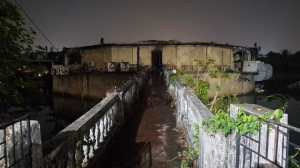Border row: India,Bangla plan land swap deal
As India and Bangladesh work overtime to resolve the long-standing border dispute,with both sides having decided to go for a major land swap.
As India and Bangladesh work overtime to resolve the long-standing border dispute,with both sides having decided to go for a major land swap to achieve the target,the big call that will have to be taken by politicians on both sides of the border is the future of the 30,000-40,000 inhabitants of the territories that are under adverse possession of the two countries or residents of the 160-odd enclaves.
As part of the proposed deal,which will have to be cleared first by the Cabinet Committee on Security (CCS) and later by Parliament through a constitutional amendment,the inhabitants of the enclaves and land under adverse possession could be given the option of either taking up the citizenship of the country India or Bangladesh if they want to continue residing in the same area or migrating to the other side.
A joint headcount of such residents has already been ordered and both sides have agreed on the performa that will have to be filled up by the residents residing in these areas.
Sources in the government told The Sunday Express that the task of demarcation of the boundary will also be finished by July-end,with a joint survey already having been conducted by officials of both sides.
Everything is likely to be finalised before December when Prime Minister Manmohan Singh visits Bangladesh on the invitation of Prime Minister Sheikh Hasina. It is learnt that Union Home Minister P Chidambaram could also visit Bangladesh in June or July to firm up the terms of the ground-breaking agreement.
Under the terms of the still-to-be-signed land swap deal,each country will get rights to the enclaves belonging to other side but that are currently in its territory. Though the issue was part of the deal between both the countries in 1971 after Bangladesh was carved out of Pakistan,a formal agreement is still to be inked. The number of enclaves that India owns inside Bangladesh is 111 (about 17,000 acres) while Bangladesh has 51 enclaves (7,000-odd acres) in India.
If the CCS clears the deal,India will yield its rights over 10,000-odd acres. Sources said some progress has also been made on the issue of the three undemarcated segments of Daikhata,Lathitilla-Dumabari and Muhuri River.
At the fourth meeting of the India-Bangladesh Joint Boundary Working Group in November 2010,which was held to resolve matters relating to the demarcation of the un-demarcated boundary between India and Bangladesh,it was decided to find a pragmatic solution to the issue of adverse possession of land.
- 01
- 02
- 03
- 04
- 05































